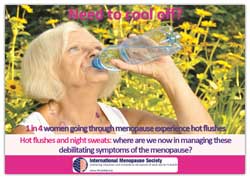To celebrate World Menopause Day, October 18th 2011, IMS launched a new campaign to create awareness of vasomotor symptoms such as hot flushes and night sweats. Prevalence of these symptoms varies throughout the world with 1 in 5 women affected in Asia, in contrast to 74% of women reported in Europe. These symptoms are both distressing and debilitating for many women, and this campaign is designed as a call to action, to encourage more women to seek help from their physicians, and to consider the safe and effective treatment options available in their countries.
IMS President, Dr Tobie de Villiers commented
“Too often the distressing symptoms associated with the menopause are not taken seriously enough. The stresses caused by these symptoms can have a significant effect on not only a woman’s life, but also the lives of those close to her, over a period of years. A woman can’t just “grin and bear it” – if only it were that simple. These are troubling symptoms caused by the menopause, which lead to physical and psychological problems in everyday life. Women need to realise that they don’t need to put up with this. For most women there are ways of overcoming these problems, and a woman going through a difficult menopause should make sure that she talks this over with her doctor to find the best solution for her”.
A review Hot flushes and Night Sweats – where are we now?

The IMS commissioned a multi-disciplinary review of the current evidence highlighting the causes and treatment options available for hot flushes and night sweats, the most prevalent and debilitating symptoms of the menopause. The review has been published in the October 2011 issue of Climacteric. Translations of the review are available free of charge to download in 6 languages and 4 variations of Spanish for the various regions in the world where this language is spoken – see links below.
The IMS grants permission to individuals only to reproduce the copies of the review for their own personal use but requests that organisations contact Ms Lee Tomkins, IMS Executive Director for advice on how to order reprints.
Awareness raising poster – Need to cool off?
This A4 poster entitled ’Need to cool off?’ is designed to raise awareness of hot flushes and night sweats and can be used in a physician’s waiting room or reception, in libraries, or during health awareness meetings for women. The poster can be used throughout the year to encourage women to seek help and advice from their health care professional about managing hot flushes and night sweats.

Patient information leaflet – ‘Need to cool off?’
This is a comprehensive booklet outlining the treatment options available to women and examines lifestyle changes, alternative treatments and self-help advice to manage the hot flushes and night sweats. Health care providers and women can read and download the leaflet (see links below) in English and many other languages.
The IMS is grateful to the Australasian Menopause Society for permission to adapt information that was originally produced for their selection of patient leaflets and fact sheets.
Source of funding
The translations of the review were supported by unrestricted educational grants from Novo Nordisk and MSD, for which the IMS is very grateful. All other costs for the provision of these educational materials were supported by IMS funds. The industry has had no influence on the choice of contributors, the content and the writing of the review, or any other campaign initiatives.
World Menopause Month
The International Menopause Society, in collaboration with the World Health Organization, has designated October 18 as World Menopause Day. In observation of the Day, the IMS and the member national societies of CAMS, the Council of Affiliated Menopause Societies, distribute materials and organize activities to inform women about menopause, its management and the impact of estrogen loss. Since it is not always possible for local societies to arrange activities for this specific day, the IMS has now designated October as World Menopause Month. Local societies can also collaborate with other organizations working in the field of adult women’s health, such as societies for osteoporosis and breast cancer, to organize joint events. World Menopause Month can also be a call to implement policies that support research and treatment in the area of menopausal health.
As the world’s population ages, there will be increasing numbers of women entering menopause and living beyond post menopause. The potential symptoms of menopause may have a negative impact on the quality of daily life. Moreover, the consequences of menopause can lead to a host of age-related diseases including heart disease and osteoporosis. Nations around the world should continue to educate women about menopause and the benefits of preventive health care.
The IMS hopes that national societies will take the opportunity of World Menopause Month to highlight the increasing importance of menopausal health issues, by contacting the women of their country to encourage them to talk to their doctors about menopause and its long-term effects.


